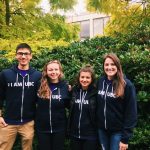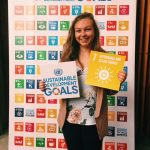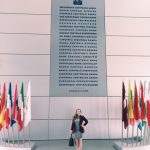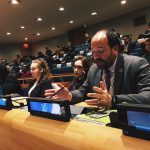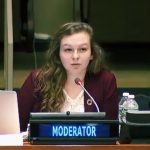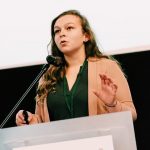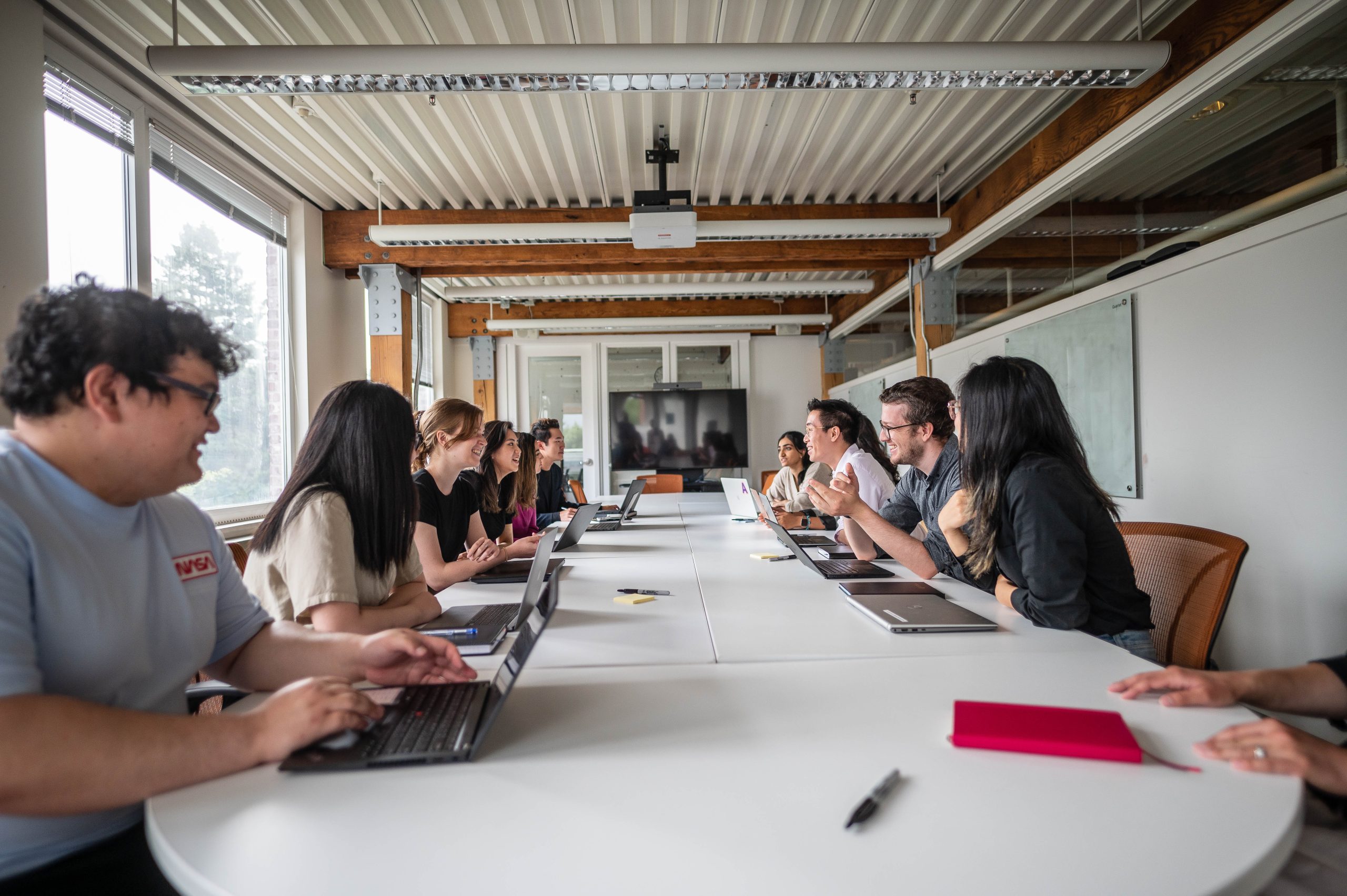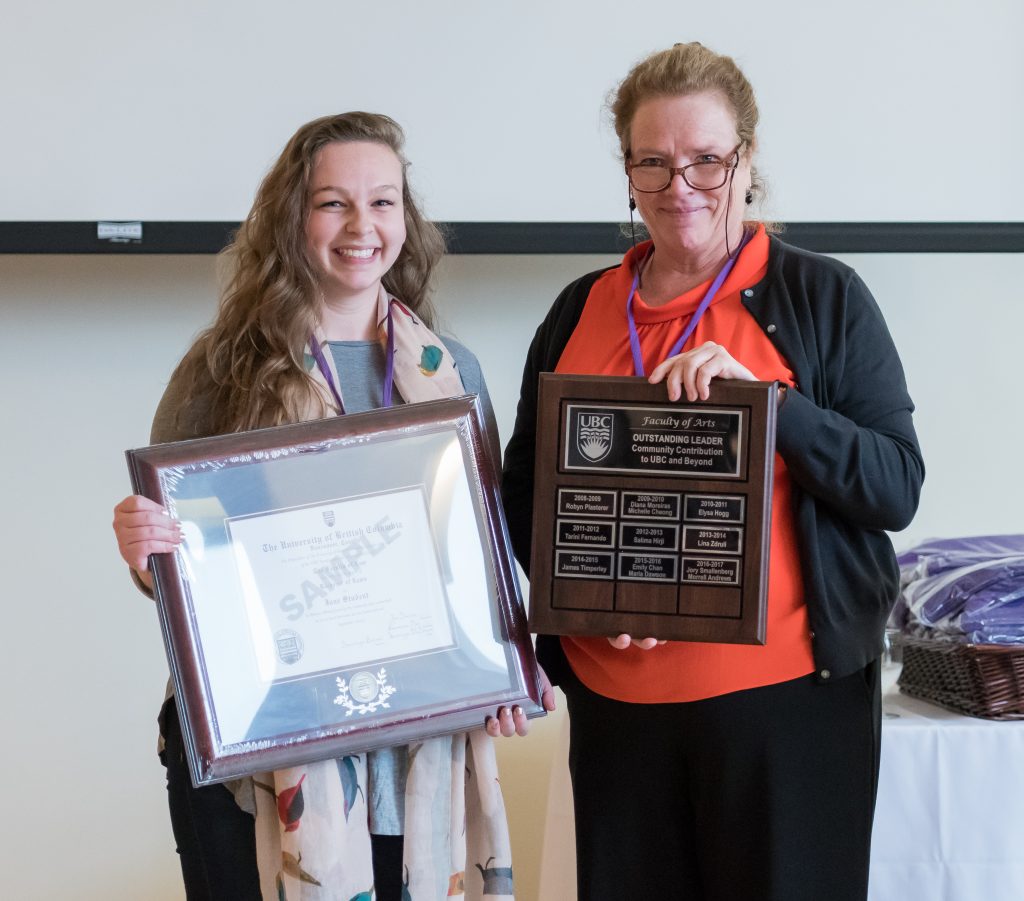

Dr. Kathryn Harrison and Morrell Andrews – a recipient of the Outstanding Leader in the UBC Community and Beyond award
In March 2017, Morrell Andrews received the “Outstanding Leader in the UBC Community and Beyond” award for her exceptional contributions to on-campus leadership and global citizenry. During her time at UBC, Morrell consistently took the time to engage with her peers and establish on-campus initiatives, serving with the Student Leadership Conference, the Collegia Program, Co-op, Go Global, AMS, The Calendar, Destination UBC and the President’s Non-Academic Misconduct Committee.
She presented her award-winning research in Ireland and Harvard, and has represented youth in six meetings at the United Nations, voicing her concerns about youth inclusion and status of women in government. Morrell says the one constant throughout her degree has been the time spent working with the campus community and her appreciation for how university should be about more than textbooks and lectures. We caught up with her to find out what life lessons she’s learned during the past five years, and what her future plans are.
Hometown: Don’t have one! I’ve lived all over the place.
Program of Study: International Relations major and Political Science minor
UBC Affiliations and Awards:
Affiliations: Student Leadership Conference, The Calendar, AMS, Collegia, Go Global, Arts Co-op, the President’s Non-Academic Misconduct Committee and Orientations
Awards: Arts Research Abroad Award, Arts Co-op Student of the Year Honourable Mention, Robert and Kazuko Barker Award, Bhagwan Kaur wife of Gokal Singh of Halwara Award in Arts, Highly Commended Award at Undergraduate Awards, Go Global Special University Award for Conferences
Where can we connect with you? Find me on Twitter & Instagram @morrellandrews or on LinkedIn
Why did you choose your academic program of study?
I came to UBC as a transfer student in my second year, originally from a science program in Ontario that was a terrible fit, and I really had no idea what I wanted to study. When I finally arrived in Vancouver, I was just happy to be somewhere new with the gut feeling that an adventure was waiting for me. It was a time in my life when I felt very lost and unsure of what path to take. All I knew was that by trying a little bit of everything and getting involved, this would be the place that I would find what was right for me. I took courses in Philosophy, Psychology, Law and Society, German, French, Economics, African Studies, and Central, Eastern & Northern European Studies, but it wasn’t until I found myself in Dr. Sens’ Global Politics class that I discovered what I wanted to dedicate my degree and career to. His class was the first I would never be tempted to skip, because I loved learning about the complexities of the international system and how conflict, human rights, organizations, trade, and policy impact how states interact. I decided to apply to the International Relations program and took six courses in my second semester to get ahead in the requirements, and when I was accepted in May 2014, I never looked back!
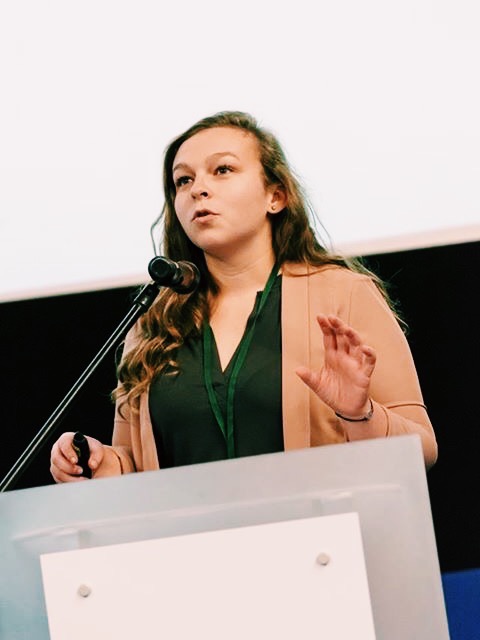

Morrell published three academic papers during her time at UBC, which brought her to Ireland as an award winner through the 2016 Undergraduate Awards Programme.
What are some of the most meaningful experiences you’ve had at UBC?
My time here has been so fulfilling because of the incredible experiences that I have been lucky to have as a student in the Faculty of Arts. I have traveled to twenty countries in my degree alone – from South Africa to Iceland to Japan. I have been fortunate to see the world and apply what I learned in the classroom to the issues on the ground. In the summer of my third year I participated in two Global Seminars that allowed me to conduct research in Ethiopia on an incredible team of undergraduates under the careful guidance of Dr. Coleman, and participate in the Coexistence in the Middle East program at Hebrew University in Israel. After that, everything else sort of came together.
My participation in Arts Co-op gave me access to roles in the federal government at Global Affairs Canada in Ottawa where I worked in North America Advocacy and European Trade Relations. The passion for research that I discovered early on at UBC drove me to participate in a third Global Seminar in the EU and publish three academic papers, which brought me to Ireland as an award winner through the 2016 Undergraduate Awards Programme, and to the 2017 National Collegiate Research Conference at Harvard University. I have also represented youth in six meetings at the United Nations in New York, and moderated a panel session during the 2017 Youth Commission on the Status of Women Forum organized by UN Women. These are only a sample of the meaningful opportunities for experiential learning that UBC has empowered me to be a part of, but those are definitely the highlights.
What’s an important life lesson that your involvement activities have taught you?
The one constant throughout my degree has been the time spent working with students and the campus community. After joining The Calendar, I learned what inclusive leadership looks like, and gained an appreciation for how our time at university should be dynamic and filled with more than just textbooks and lectures. I learned just as much planning parties and working on improving campus culture as I did during classes. Through this realization, I joined more organizations, took on more responsibility, and found a love for student development. My time with the Student Leadership Conference, Orientations, the Collegia Program, Destination UBC, Community Based Experiential Learning, UBC Recruitment, Co-op, Go Global, the AMS, the President’s Non-Academic Misconduct Committee, and on many other diverse teams, showed me the value of service and gave me the skills to leverage my experiences. My involvements also taught me the valuable life lesson of having grit in the face of rejection – even when it is very painful. I have been rejected and failed many more times than I have been successful, but I learned how to frame those lessons in a way that made me even more motivated to push my limits and make my time here count.
You recently received a 2017 Outstanding Leader award. What do you think makes a great Arts student leader?
I know that a great student leader in the Faculty of Arts comes in different forms because I have had the privilege of working with so many. Every single student here has the capacity to make a difference in their own unique way. The common theme that I’ve observed is that the greatest leaders are focused on empowering members of the community. They are selfless with their time, willing to mentor their peers, determined to make a difference, aware that strong and inclusive teams produce results, willing to take risks and be innovative, and not afraid of taking on a challenge. I think it is vital for any leader to think big and look beyond the present, but always keep in mind why they do the work that they do.
If you had the chance to re-start your UBC experience, what would you do differently?
At the end of a five-year post-secondary education that has spanned three universities, I can say with confidence that I would not change a thing. My experience was by no means easy, and any semblance of a healthy sleep schedule was out of reach at all times, but I have been so immersed in what I love to do that I could not imagine having a better experience (or fitting more into my schedule). UBC and its incredible staff and faculty have facilitated and supported so many phenomenal learning experiences for me that have shaped my ambitions and sense of self in every way – you can’t ask for more than that.
What’s next for you?
I had a few job offers to choose from (shoutout to Arts Co-op), and I’m excited to have recently accepted a Fellowship with the Aga Khan Foundation’s Development Network in Nairobi, Kenya. I’ll be working on youth and civil society issues that have important implications for human security in the East Africa region. My role begins in August. After graduation I fly to Germany to represent Canadian youth on the official delegation to the Youth 20 Summit ahead of this year’s G20 in Hamburg. I’m extremely excited to meet my counterparts from around the world and to contribute to the communiqué that we will deliver to the G20 leaders. For the next few years I look forward to working in the field on the issues I care about the most, and then pursuing higher education in International Relations or Law after I have a solid understanding of what work is being done on the ground.
- Morrell travelled to 20 countries during her undergraduate degree – from South Africa to Iceland to Japan.
- “The one constant throughout my degree has been the time spent working with students and within the campus community,” says Morrell.
- The Collegia ProgramTeam.
- At the UN International Youth Day in 2016.
- At the European Central Bank in Germany during a Global Seminar.
- Morrell represented youth in six meetings at the United Nations in New York City.
- Morrell moderated a panel session during the 2017 Youth Commission on the Status of Women Forum organized by UN Women.
- Morrell published three academic papers during her time at UBC, which brought her to Ireland as an award winner through the 2016 Undergraduate Awards Programme.
- “At the end of a five-year post-secondary education that has spanned three universities, I can say with confidence that I would not change a thing.”

